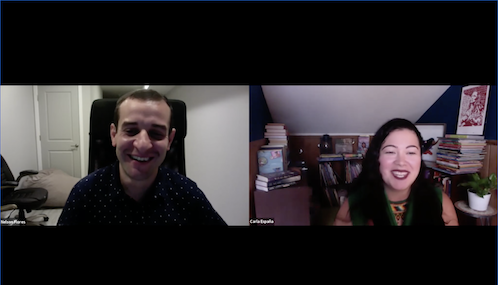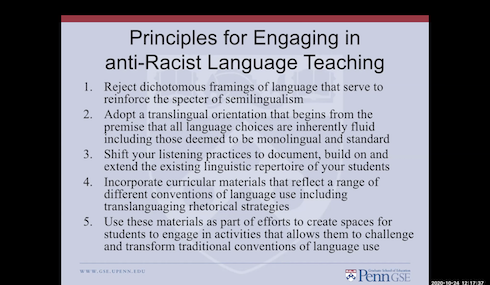
On October 24, Bank Street Graduate School of Education hosted the Language Series conference online, an annual event to help educators strengthen their practice with developmentally appropriate language learning tools and techniques. This year’s topic, “Anti-Racist Language Teaching,” provided space for educators to explore approaches that support language-minoritized children and build their understanding of curriculum and pedagogy that validate the language practices of all children.
To begin, Nelson Flores, Associate Professor of Educational Linguistics, University of Pennsylvania Graduate School of Education, shared the keynote presentation titled “Translanguaging Into Anti-Racist Language Teaching,” in which he explored the history of raciolinguistic ideologies. Flores discussed how this framework—”co-constructing language and race in ways that frame the language practices of racialized communities as deficient and in need of remediation”—appears in schools.
“These raciolinguistic ideologies, the specter of semilingualism, creates these raciolinguistic categories in schools where the official school designation pathologizes the language practices of racialized communities. This is where we get ‘Long Term English Learner,’ ‘English Learner,’ ‘Academic Language Learner,’” said Flores as he discussed the impact of deficit-oriented labels on students. “We need new ways to describe our students so that they’re getting the supports that they need and we need to provide that discourse to teachers so they can describe their students differently.”
Flores, who grew up in a bilingual home in Philadelphia and later became an English as a Second Language teacher in the Bronx, shared how his own experiences shaped his work and interests as a researcher. During his early teaching career, Flores struggled with the disconnect of seeing his students use both English and Spanish fluently and creatively on a daily basis but having them described through a deficit perspective as “Long Term English Learners.”
 He explained that educators can challenge semilingualism and engage in anti-racist language teaching by shifting toward a translingual orientation, which “treats all language as emergent, fluid, and constantly in flux” and “recognizes differences as the norm.” In the classroom, for example, teachers can incorporate translanguaging mentor texts to highlight language diversity and teach strategies that build on children’s existing language repertoire.
He explained that educators can challenge semilingualism and engage in anti-racist language teaching by shifting toward a translingual orientation, which “treats all language as emergent, fluid, and constantly in flux” and “recognizes differences as the norm.” In the classroom, for example, teachers can incorporate translanguaging mentor texts to highlight language diversity and teach strategies that build on children’s existing language repertoire.
“A translingual orientation that begins with the premise that all language choices are inherently fluent, including those that are deemed to be monolingual and standard, is an alternative to a dichotomous view of language,” said Flores as he concluded with principles for engaging in anti-racist language teaching. “If we can begin from that perspective, it might allow us to see and perceive the language practices of our students differently.”
At the end of the presentation, Carla España, Supervised Fieldwork Advisor & Course Instructor, Bank Street Graduate School of Education, facilitated a question and answer session with Flores for participants to further discuss translanguaging and strategies to support students and their families.
Following the keynote presentation, attendees convened at workshops centered on this year’s theme, including “The Role of Children’s Literature in Anti-Racist Approaches to Teaching with Families with Dr. Eliza Braden and Dr. Sanjuana Rodriguez,” “Creating an Anti-Racist Comunidad: Centering las Voces de Latinx Students in the Secondary Spanish Classroom with Michaela McCaughey and Jen Lopez,” and “Literacy in the Home: Supporting the Literacy Practices of Language-Minoritized Parents and Families with Klem-Marí Cajigas and Liz Atack,” among others.
“Nelson Flores shared a deeply important and insightful keynote presentation that allowed participants to re-think how they describe bilingual students and incorporate translanguaging into their classroom instruction,” said España. “We are grateful for our attendees and workshop leaders who joined us virtually from across the country—from Brooklyn to Santa Barbara—to participate in this day of learning and sharing.”